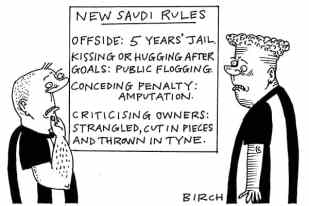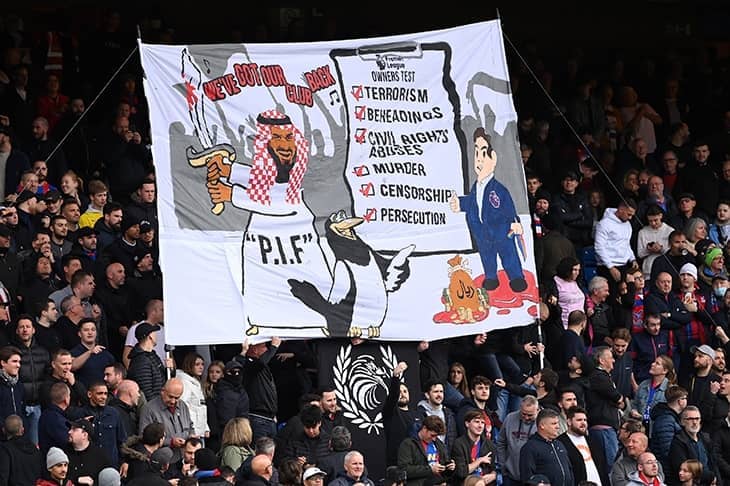The second thing I learned about football, after moving to London, is that you can never, ever switch your allegiance. That was unfortunate, because the first thing I discovered was that I liked Newcastle United and had already chosen them as my team. It’s been fairly relentless pain ever since. In 2016, I watched Newcastle get relegated. They bounced back to the Premier League the next season, but it’s been utter mediocrity ever since.
I’ve followed them from stadium to stadium, unwavering in my support, cheering on often extremely boring and disappointing football. I like the idea of loyalty in sports; to ditch a team because they depress you would show weakness of character. It doesn’t matter how awful Newcastle are, I thought, nothing could put me off.
Then blood money funnelled into the team a few weeks ago and now I’ll admit the burden of fanship feels unbearably heavy. It’s a bad sign for undying loyalty when you find yourself rooting for the other side: in my case, Crystal Palace last weekend. Not the team, but the fans, who were holding up a massive banner depicting our new owners — Saudi Arabia Public Investment Fund — as an Arab oligarch holding a bloody sword, next to a list of the human rights abuses committed by the Saudi regime, including ‘beheadings’, ‘censorship’ and ‘persecution’.

All legitimate accusations. The PIF, which has put up 80 per cent of the funding to buy the team, is the Kingdom’s sovereign wealth fund. Prince Mohammed bin Salman Al Saud — whom Boris Johnson told us to cheer on because he allowed women to drive — sits on the board. If you can’t separate Huawei from the Chinese Communist party (and you can’t), then there’s no fudging the ugly truth that brutal dictators now preside over St James’ Park.
The Palace fans’ banner hit the sweet spot of politics, humour and a huge platform, so naturally the Met police felt compelled to investigate it. To the so-called progressive mind — to which the police show such deference these days — allegations of ‘offensive’ material and ‘racist’ abuse, no matter how unfounded, trump the countless crimes of the Saudi state. After two days — an excellent use of police resources — the investigation was dropped. But the gritty reality has stuck with me. And for football fans all over the country, the ethical quandaries aren’t going away. How long can we all turn a blind eye to the realities of England’s beautiful game? For all the schadenfreude being directed at Newcastle, it’s not as if other clubs can talk.
Arsenal fans must know that their team distanced itself from Mesut Özil in 2019 after he drew attention to the atrocities committed against China’s Uighur population. Taking to Chinese social media, the club insisted it stuck by its ‘principle of not involving itself in politics’ — the ‘politics’, in this case, being genocide.
For football fans all over the country, the ethical quandaries aren’t going away
That was a business decision, simple and clear: the Chinese market is worth hundreds of millions of pounds to the League — one midfielder’s moral compass can’t be allowed to outdo that. When it comes to China, we see the same in other sports. The National Basketball Association in the United States, acutely aware that 10 per cent of its revenues come from China, declared that it was ‘regrettable’ that the Houston Rockets general manager had tweeted his support for pro-democracy protestors in Hong Kong.
David Beckham is under fire this week for accepting the £150 million position of ambassador to the 2022 Qatar World Cup. He has been assured by Qatari leaders that rainbow flags will be allowed to fly in the stadium, which he feels will help advance a progressive message in a country set in its backwards ways. Not everyone is convinced. Accusations of ‘sportswashing’ are flying around. That’s exactly what it is: money from a corrupt and morally bankrupt regime is being used to give its human rights abuse a world-famous footballer to hide behind. It’s grotesque — but the whole World Cup spectacle gives the Qatari dictatorship cover. In reality, Beckham is no more an ambassador than our beloved England squad will be. The boys will no doubt kneel before the start of every game to say that Black Lives Matter, and quite right too. But will they make a peep about the fact that the stadiums they are playing in are effectively burial sites for migrant workers who died building them? We will all be ambassadors for that, with every 2022 World Cup T-shirt we buy, every seat bought in the stands and private boxes, every #Qatar2022 tweet.
Perhaps it’s my bitterness over Newcastle’s sudden ill-gotten gains that makes me want to bring everyone down to our level. But aren’t we already navigating in strange moral waters? The UK’s arms sales to Saudi Arabia remain almost completely unquestioned, yet the sale of NUFC sparks major news outrage? Under David Cameron, the British government was allegedly assisting Saudi in targeting attacks on Yemen, yet Meghan Markle’s decision to wear earrings given to her by MBS is what sparks furore in the papers. The earrings were ugly, no doubt — a telling insight into the wannabe people’s princess. But surely the fact that Saudi has accounted for 40 per cent of UK arms exports over the past decade should give us more pause. The soft-power stuff — elaborate gifts, club purchases — probably shouldn’t be as troubling.
Or perhaps I’m just trying to square these brutal facts with my ongoing club loyalty. We’re all guilty. Will I cheer when a spectacularly well-funded Newcastle side, brimming with world-class talent, starts to score more goals? I’m afraid to say I probably will. But my hypocrisy will stop it feeling as good as it should.
I chose Newcastle because an old colleague, now a good friend, supported them and explained the game to me, an American in England. I was so grateful for her kindness and thought, if this is NUFC, that’s for me. And it still is — but my affection for the game is fading fast.







Comments